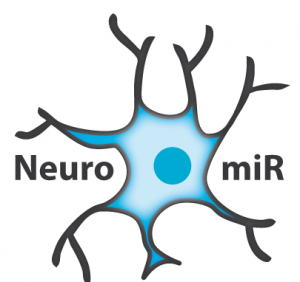 microRNA as novel therapeutic targets and disease biomarkers in Alzheimer’s Disease, Frontotemporal dementia and Amyotrophic lateral sclerosis
microRNA as novel therapeutic targets and disease biomarkers in Alzheimer’s Disease, Frontotemporal dementia and Amyotrophic lateral sclerosis
NEURO-MIR focuses on the role of microRNA (miRNA) in neurodegeneration. miRNA are small (~22 nucleotide), non-coding RNA that control the expression of multiple genes. Data from members of the NEURO-MIR consortium has shown that deregulation of miRNA contributes to the pathogenesis of Alzheimer’s disease and motoneuron disorders. NEURO-MIR aims to explore the full potential of miRNAs as key contributors to disease progression and as therapeutic targets and biomarkers. NEURO-MIR also realises that the complexity of miRNA biology can only be tackled through bioinformatics and computational modelling approaches, and will develop a computational platform that will allow to approach the role of miRNA in neurodegeneration on a ‘holistic’, systems level.
Alzheimer’s disease (AD), frontotemporal dementia (FTD) and amyotrophic lateral sclerosis (ALS) are distinct neurodegenerative disorders, but share common disease pathways and susceptibility genes. Recent data suggest that deregulation of epigenetic mechanisms including non-coding RNAs contribute to the pathogenesis of these disorders. miRNA regulate up to 30% of all protein-coding genes, with each miRNA controlling multiple, often hundreds of proteins. Due to their unique biological function and in vivo-stability, miRNA is arguably one of the most interesting area for drug and biomarker development. NEURO-MIR partners have identified neuronal miRNAs that modulate synaptic activity, network (hyper)excitability, protein processing and degradation, autophagy and apoptosis. However, their complex biology makes effects of miRNA and miRNA manipulation difficult to predict, and their potential as therapeutic targets and biomarkers has not yet been systematically studied. NEUROMIR aims to explore the full potential of miRNAs as key contributors to disease progression and as therapeutic targets and biomarkers. NEURO-MIR also realises that the complexity of miRNA biology can only be tackled through bioinformatics and computational modelling approaches, and will develop a systems biology platform that will allow for the first time to approach the role of miRNA in neurodegeneration on a true systems level.
Neuro-miR is funded by COEN: Centres of Excellence in Neurodegeneration.